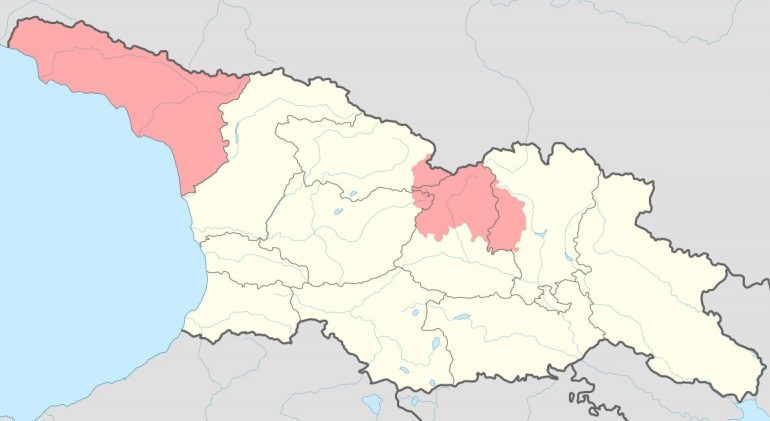Ten years ago almost to the day, in a tin-can of a car with two impromptu pals, I found myself bouncing along a rutted muddy track across tilled earth toward Russian lines. The Kremlin had just invaded Georgia. They occupied the town of Gori, Stalin’s birthplace and home of the Stalin museum. The only access for journalists into the town came via official Russian accreditation and a flight from Moscow but my Georgian friends knew a back way as yet undetected by Ruski forces around farms and ramshackle outbuildings. So it turned out that I became the sole Western journo able to report on crimes committed behind the lines by Russian troops and allied Ossetian militia. The extensive looting at night, the kidnapping and ‘disappearing’, the targeting of historic buildings sacred to Georgian national memory.
I reported it all in the Wall Street Journal but alas to no avail. Moscow rolled out a meticulously pre-gamed plan of action fully calculating that the West would prefer, would want to believe, Putin’s propaganda over the Georgian side’s. Just to avoid trouble with the Russian bear. And so it proved. A pusillanimous EU preferred the narrative of a ‘crazy’ Georgian President (Saakashvili) gratuitously provoking the otherwise peaceable Putin into invading in order to protect the victimized pro-Moscow South Ossetian separatists. As for the White House, on August 8, 2008, President Bush was swanning around the Beijing Olympics taking a break from the enmired misery of two disastrous wars. He had no stomach for another fight. He needed Putin’s help to keep open American supply lines to Afghanistan via the Uzbeks and Tajiks. (Putin soon shut those down too.)
I tried and tried to tell the Georgian side to my colleagues in other organs wherever I encountered them and in global newsmedia endlessly but it helped not a whit. Even damaged my own reputation for impartiality. In fact, Moscow had preplanned the entire operation down to the timing and propaganda. Much of it has come out by now. But you could uncover it clearly enough at the time, with a little probing. Here’s an item from page 234 of the recent book “Putin’s Wars”: (according to Russian General Yuri Baluevsky) “a decision to invade Georgia was made by Putin… in May 2008. A detailed plan of military action was arranged and unit commanders given specific orders in advance”. And here’s what happened, for the record: the South Ossetian militias ramped up attacks against the Georgian side daily. Moscow had already placed illicit Russian forces among the separatists helping and hoping to create a provocation – the kind of destabilizing activity we have now seen so often elsewhere. Georgian President Saakashvili, abroad at the time, imposed restraint on his (bridling) troops. He raced back knowing that Moscow had built up invading forces for months. He knew they were pushing for a provocation. In the event, they didn’t even wait for that. He got news from a spy among the Russians that the invasion had begun and Russian armor was pouring through the Roki tunnel into South Ossetia. So he ordered a pre-emptive attack on South Ossetian strongholds hoping to stop the Kremlin invasion before it gained momentum.
Moscow turned that into the provocation they needed. But it suited nobody to believe the Georgian version. America and the West refused to stop Putin when they could and now his Machiavel whirligig endangers us all within. Saakashvili said it repeatedly for years afterwards and he nails it again in the WSJ op-ed page that appeasing a despot early on leads to existential confrontation later. He literally predicted subsequent Russian hostilities in Ukraine. All the messing with elections in the West, and all the disinformation: It was all tested in Georgia. And ultimately it succeeded, even to the extent of unseating Saakashvili.
I wrote about how the patterns of trickery used against his party during the October 2012 election looked uncannily similar to the Trump election. Nobody believed that the Kremlin would actually interfere with a nationwide American vote. But why wouldn’t they? They got away with every other brazen violation beyond their borders. The more brazen, the harder to believe. So much easier to blame the losing side or candidate for, somehow, deserving the loss. I covered the 2012 national election in Tbilisi (for Newsweek). As with the 2008 war, again our Western news media proved hideously credulous, playing into the Kremlin’s narrative, buzzing around a colorful opposition leader who refused to criticize invader Putin, who refused to disclose details of his finances (rooted in Moscow), who claimed the ballots would be rigged against him, who railed against globalization and foreigners. Whom nobody thought would win. Who benefited from a last minute surprise likely engineered by Moscow proxies – among other maneuvers now familiar to us all. Western news media simply refused to see the danger, demanding fairness from the pro-American candidate and imputing to him all manner of ‘deep state’ evil while presenting his opponent as a kind of clueless eccentric. Moscow’s shadow loomed everywhere but no, it wasn’t possible. Moscow wouldn’t actually interfere in the bright light of day in a foreign election watched by all.
Where are the intrepid reporters and commentators now who blamed Saakashvili for starting the 2008 war? Where are their mea culpas? They steadfastly stuck to their ‘balanced’ posture – as if complete imperviousness to geostrategic considerations was a kind of purity – until finally the consequences have arrived at their own door. That’s what happens when you ignore geostrategy aka ‘context’ long enough. There was context aplenty even before the invasion of Georgia, Moscow’s post-Soviet bullying had history. Russia spent years torturing Ukraine by shutting off fuel pipelines in midwinter, by poisoning Kiev’s young newly elected leader, by wearing out the population’s support of any anti-Moscow stance through the accumulation of misery. Hard times came to be associated with the peculiar vanity of the defiant leader. It was his fault for being provocative, for being grandiose and combative and even authoritarian. Why authoritarian? Because the Kremlin’s endless dirty tricks in its post-Soviet near-abroad forced those targeted governments to crack down relentlessly on suspicious activity. In a democratic system, the government took the fall at the next election. Precisely what the Kremlin intended. Use democracy against itself.
In Georgia, context meant knowing about the myriad such Kremlin tricks just during Saakashvili’s tenure in office. Activities to revive mafias, to bribe officials, to bomb railway tracks, to influence oligarchs, to impose sanctions and harm the economy, to prime the opposition media, cyberattacks, dummy runs by Russian warjets and much else. Even the seminal 2006 visit of George Bush to Tbilisi on a state visit, the first by a US prez, was almost marred by a terrorist in the exultant crowd, a Soviet nostalgist. And yet none of this seemed to matter to Western media reporting on both the invasion and the 2012 election. Nor even the thought that it wouldn’t stop with Georgia. If pro-Western leaders lost at the polls after sustained Russian abuse, well, that’s democracy for you. But it isn’t, is it? Not if there’s brutish outside interference. Or outside money or threats or meddling with the election process.
Melik Kaylan, Forbes.com















